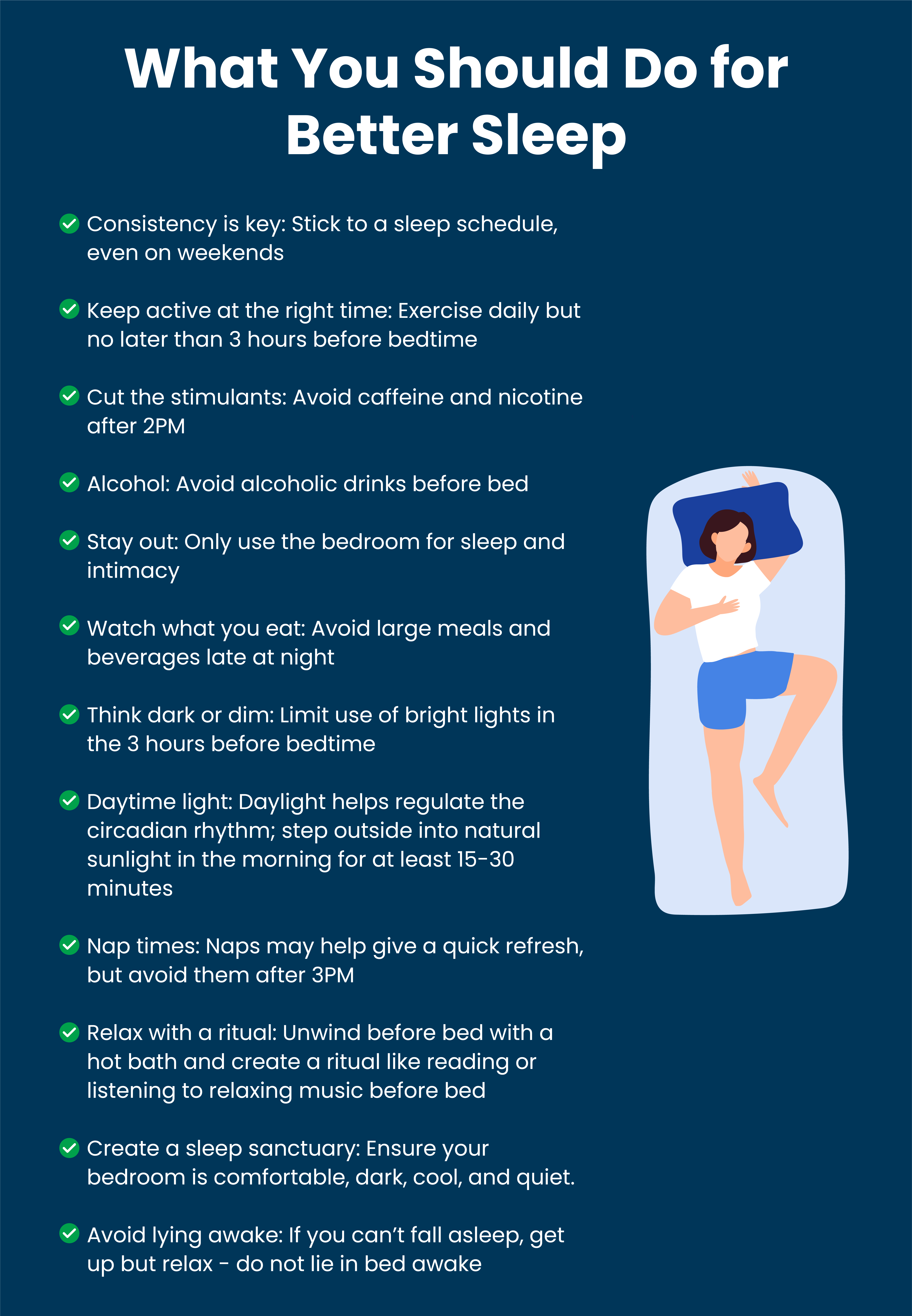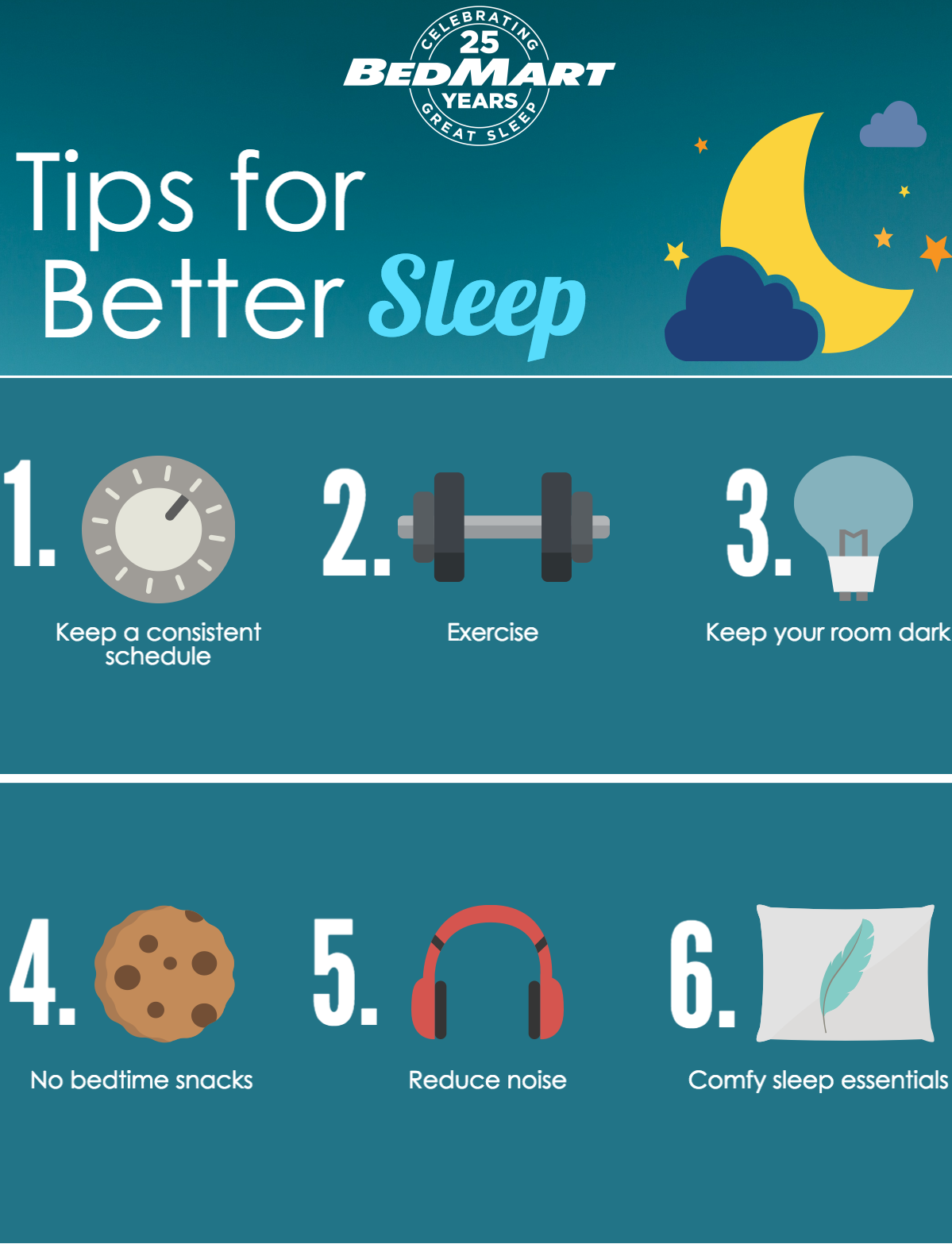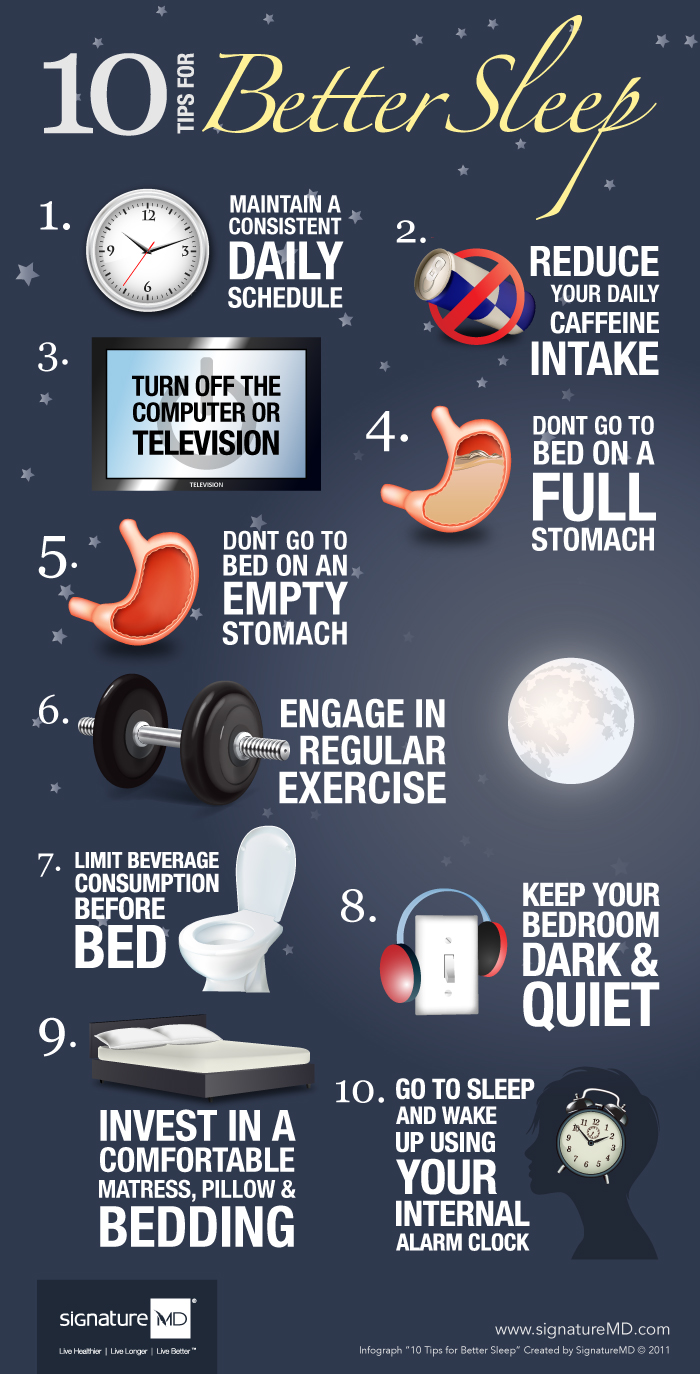How to Sleep Better? Discover Proven Tips for Restful Nights
Want to sleep better? Follow these simple steps for a restful night.
Sleep is vital for health and well-being. Lack of sleep can affect mood, energy, and overall health. Many struggle to get quality sleep each night. Stress, screens, and daily habits can disrupt sleep patterns. But, improving sleep is possible with a few changes.
This guide will show you how to sleep better with practical tips and habits. Discover ways to create a sleep-friendly environment and establish a calming bedtime routine. Learn how to adjust your daily activities to promote better sleep. Ready to wake up refreshed and energized? Let’s dive into the secrets of a good night’s sleep.
Importance Of Quality Sleep
Quality sleep plays a crucial role in maintaining overall health. It affects both physical and mental well-being. Good sleep helps the body recover, repair, and rejuvenate. Without quality sleep, daily functioning becomes challenging. Understanding its importance can motivate you to improve your sleep habits.
Health Benefits
Quality sleep boosts the immune system. It helps fight infections and diseases. Your heart health improves with proper rest. It reduces the risk of chronic conditions like diabetes and hypertension. Sleep also aids muscle recovery and growth. Athletes and fitness enthusiasts need quality sleep to perform better.
Mental Well-being
Sleep impacts mental health significantly. It helps in managing stress and anxiety. Quality sleep improves mood and emotional stability. It enhances cognitive functions like memory and focus. You can think clearly and make better decisions. Lack of sleep may lead to mood disorders like depression.

Create A Sleep-friendly Environment
Creating a sleep-friendly environment is essential for a good night’s rest. Your bedroom should be a sanctuary for sleep, free from distractions. By making simple changes, you can improve your sleep quality significantly.
Optimal Room Temperature
The temperature of your room plays a big role in your sleep. A cooler room helps your body cool down faster, which is necessary for sleep. Experts recommend keeping your room between 60-67 degrees Fahrenheit. This range promotes the best sleep. Use a fan or air conditioner if your room is too warm. If it’s too cold, add extra blankets or use a heater. Finding the right temperature can make a huge difference.
Comfortable Bedding
Comfortable bedding can transform your sleep experience. Start with a good-quality mattress that supports your body. It should not be too hard or too soft. Choose pillows that keep your neck aligned with your spine. This will help prevent neck pain. Your sheets and blankets should be soft and breathable. Cotton and linen are great choices. They keep you comfortable and cool during the night. Regularly wash your bedding to keep it fresh and free from allergens. Comfort is key to a restful night.
Establish A Bedtime Routine
Setting up a bedtime routine can improve your sleep quality. A routine helps signal your body that it’s time to relax and prepare for sleep. Here, we discuss how to establish an effective bedtime routine.
Consistent Sleep Schedule
Maintain a consistent sleep schedule by going to bed and waking up at the same time every day. This helps regulate your body’s internal clock. It can make falling asleep easier and waking up less stressful. Even on weekends, try to stick to your schedule.
Inconsistent sleep schedules can confuse your body. You might find it hard to sleep on Sunday night after staying up late on Saturday. Consistency is key to better sleep.
Relaxation Techniques
Include relaxation techniques in your routine to calm your mind before bed. Here are some ideas:
- Read a book
- Take a warm bath
- Practice deep breathing exercises
- Listen to soothing music
- Write in a journal
These activities help reduce stress and prepare your mind for sleep. Avoid activities that are stimulating. This includes watching TV or using your phone. The blue light from screens can interfere with your sleep.
Incorporate these steps into your nightly routine. Over time, you’ll find it easier to fall asleep and stay asleep.

Credit: www.shopbedmart.com
Diet And Sleep Connection
Did you know that your diet can affect your sleep quality? What you eat can either help you sleep better or keep you awake at night. Understanding the diet and sleep connection can improve your rest and overall health.
Foods To Avoid
Certain foods can disrupt your sleep. Avoid heavy, rich meals before bedtime. These meals can cause indigestion and keep you awake. Spicy foods can also cause heartburn, making it hard to fall asleep.
Limit caffeine intake, especially in the afternoon and evening. Caffeine is a stimulant and can keep you awake. Be mindful of hidden caffeine in chocolate, tea, and some medications. Alcohol might make you feel sleepy at first, but it can disrupt your sleep cycle.
Sleep-promoting Snacks
On the other hand, some snacks can help you sleep better. A small snack with complex carbs can help. Try a piece of whole-grain toast or a small bowl of oatmeal. These foods increase serotonin, which promotes sleep.
Foods rich in magnesium can also aid sleep. Include nuts, seeds, and leafy green vegetables in your diet. A small banana can also be a good choice. Bananas contain both magnesium and potassium, which relax muscles.
Consider a glass of warm milk. It contains tryptophan, which can promote sleep. Herbal teas like chamomile or valerian root can also be calming. Choose these snacks to improve your sleep quality.
Limit Screen Time
Struggling to get a good night’s sleep? One of the most effective ways to improve your sleep quality is to limit your screen time before bed. Screens emit blue light, which can interfere with your sleep cycle. By reducing your exposure to screens in the evening, you can help your body prepare for a restful night. Let’s explore the effects of blue light and some alternative evening activities to help you wind down.
Effects Of Blue Light
Blue light from screens can disrupt your sleep. It tricks your brain into thinking it is still daytime. This suppresses the production of melatonin, the sleep hormone. Without enough melatonin, it becomes harder to fall asleep and stay asleep.
Studies show that exposure to blue light before bed can lead to poor sleep quality. It can also affect your overall health. To avoid this, try to limit screen time at least one hour before bed.
Alternative Evening Activities
Instead of using screens, consider engaging in activities that promote relaxation. Here are a few ideas:
- Reading a book: Choose a physical book or an e-reader with a blue light filter.
- Listening to music: Opt for soothing tunes to help calm your mind.
- Taking a warm bath: A warm bath can help relax your muscles and prepare your body for sleep.
- Practicing meditation: Simple meditation techniques can reduce stress and promote relaxation.
These activities can help you unwind and signal to your body that it is time to sleep. Remember, creating a bedtime routine without screens can significantly improve your sleep quality.
Manage Stress And Anxiety
Sleep can be elusive when stress and anxiety are present. They disrupt your peace of mind and keep you awake. Managing these feelings is key to achieving restful sleep. Here are some effective strategies to help you manage stress and anxiety.
Mindfulness Practices
Mindfulness practices help you stay in the present moment. They reduce stress and calm your mind. Here are a few simple practices:
- Meditation: Spend a few minutes each day in quiet reflection. Focus on your breath and let go of distracting thoughts.
- Body Scan: Lie down and focus on different parts of your body. Notice any tension and consciously relax those muscles.
- Gratitude Journal: Write down things you are grateful for. This shifts your focus to positive aspects of your life.
Breathing Exercises
Breathing exercises calm your nervous system. They are easy to do and very effective. Here are a few techniques:
- 4-7-8 Breathing: Breathe in for 4 seconds, hold for 7 seconds, and exhale for 8 seconds. Repeat this cycle a few times.
- Box Breathing: Inhale for 4 seconds, hold for 4 seconds, exhale for 4 seconds, and hold again for 4 seconds. Continue this pattern.
- Deep Belly Breathing: Place your hand on your belly. Inhale deeply through your nose, letting your belly rise. Exhale slowly through your mouth.
Incorporating these practices into your routine can significantly improve your sleep quality. They help reduce stress and anxiety, paving the way for a restful night.
Exercise For Better Sleep
Exercise plays a crucial role in improving the quality of sleep. Physical activity helps to reduce stress and anxiety, making it easier to fall asleep. Regular exercise also helps to regulate the body’s internal clock, ensuring a more consistent sleep pattern.
Best Times To Exercise
Choosing the right time to exercise can significantly impact your sleep. Here are some tips:
- Morning Workouts: Exercising in the morning can help set a positive tone for the day. It also helps to regulate your circadian rhythm.
- Afternoon Exercise: This time is ideal for boosting energy levels and improving mood. It also helps to avoid the mid-day slump.
- Evening Workouts: Avoid intense exercise close to bedtime. It can increase heart rate and adrenaline levels, making it hard to fall asleep.
Types Of Beneficial Workouts
Different types of exercises can help improve sleep quality. Here are some beneficial workouts:
- Aerobic Exercise: Activities like walking, running, or swimming. These help to increase heart rate and improve cardiovascular health.
- Strength Training: Weight lifting or body-weight exercises. These help to build muscle and improve overall physical strength.
- Yoga and Stretching: Helps to relax the mind and body. It also improves flexibility and reduces muscle tension.
Incorporating these exercises into your daily routine can promote better sleep. Remember to choose the right time and type of exercise that suits your lifestyle.
When To Seek Professional Help
Sometimes, improving your sleep routine may not be enough. Persistent sleep issues can affect your health and daily life. Knowing when to seek professional help is crucial. This section will guide you through identifying sleep disorders and consulting a specialist.
Identifying Sleep Disorders
Many people do not realize they have a sleep disorder. Do you struggle to fall asleep or stay asleep? Do you snore loudly or wake up gasping? These could be signs of a sleep disorder. If you feel tired even after a full night’s sleep, it might be time to seek help.
Consulting A Specialist
If you suspect a sleep disorder, consulting a specialist is the next step. A sleep specialist can diagnose conditions like sleep apnea or insomnia. They will ask about your sleep habits and might suggest a sleep study. This can help pinpoint the exact issue and lead to effective treatment.
Do not ignore persistent sleep problems. Seeking professional help can improve your quality of life.

Frequently Asked Questions
How Can I Improve My Sleep Quality?
Improving sleep quality involves maintaining a consistent sleep schedule, creating a relaxing bedtime routine, and avoiding caffeine before bed. Ensure your sleep environment is comfortable and free from disruptions. Regular exercise can also promote better sleep.
What Are The Best Foods For Better Sleep?
Foods rich in magnesium, tryptophan, and melatonin, such as almonds, turkey, and cherries, can promote better sleep. Complex carbohydrates, like whole grains, can also help. Avoid heavy meals, caffeine, and alcohol close to bedtime.
How Does Screen Time Affect Sleep?
Excessive screen time before bed can interfere with sleep. The blue light emitted by screens can disrupt your body’s natural sleep-wake cycle. It’s best to limit screen use at least an hour before bedtime and engage in relaxing activities instead.
What Is The Ideal Sleep Environment?
An ideal sleep environment is cool, dark, and quiet. Use blackout curtains, earplugs, or white noise machines to minimize disruptions. A comfortable mattress and pillows are essential. Keep electronic devices out of the bedroom to avoid distractions.
Conclusion
Improving sleep isn’t complicated. Small changes can make a big difference. Start with a bedtime routine. Avoid screens before bed. Keep your room dark and quiet. Limit caffeine and heavy meals. Exercise regularly. Manage stress with relaxation techniques. Better sleep leads to better health and happiness.
Take these steps today. Sleep well tonight. Feel better tomorrow.
Daniel Hart is a consumer product analyst who specializes in mattress technology, smart bedding, and home comfort innovation. Before joining Royal Comport, Daniel worked with several e-commerce research teams, testing and comparing sleep products for quality, value, and long-term performance. He brings data-driven insight and real-world testing to every review he writes.